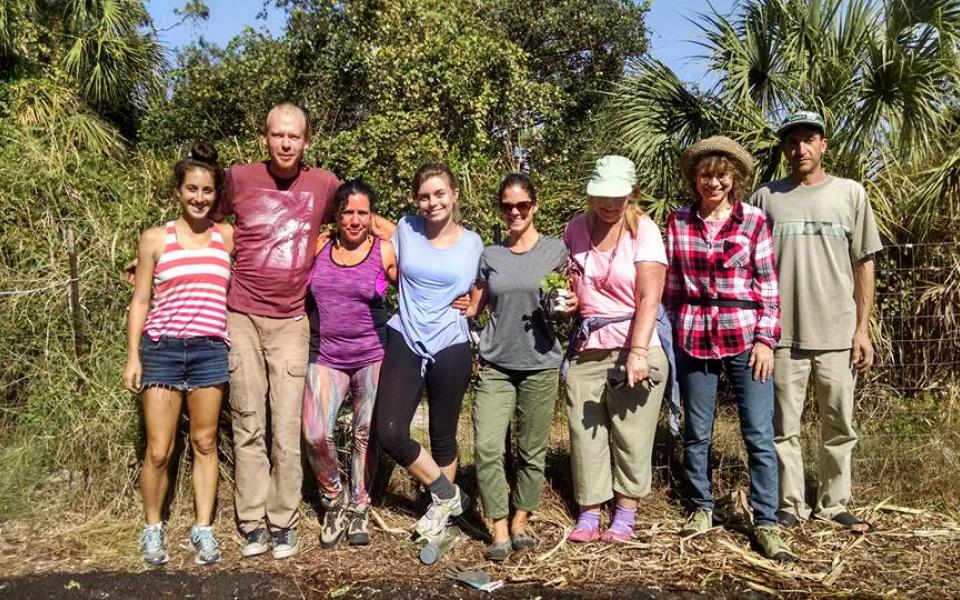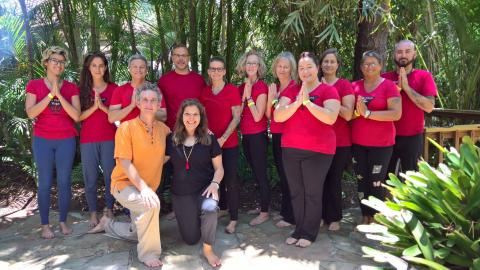
Ganga Devi joins friends from Kashi Foundation CC in their sustainable garden.
Ganga Devi Braun reflects on the questions: How do you address environmental challenges in your community? and How do your values and/or system of beliefs inform your environmental commitments?
To Heal Earth, Earth as Self
In Buddhism there is a beautiful story of the moments just before Siddhartha attained enlightenment. As the demon Mara challenged and tempted the Buddha, and all of his attendant demons cried out their witness to the powers of their master, the simple man sitting under a tree reached out his arm and gently touched the ground in front of him with his fingers. In that moment, the entire earth sang out, “I am your witness!” And as the morning star rose in the sky, Siddhartha realized complete enlightenment. It is said that in that moment, for just one moment, all suffering on the earth ceased.
I was raised in an interfaith community, and every religion that I have studied and practiced has within it the goal of ending the suffering of all beings. The intersections of the goals of the Bodhisattvas in Mahayana Buddhism and the Jewish concept of Tikkun Olam- healing the world, have become deeply intertwined in my life and my ecological work in recent years. The way I have aligned my life most thoroughly with those goals is reminiscent of the Buddha’s action- to touch the earth. Years of studying religious, ecological, and social philosophy didn’t get me far in terms of actually helping to heal the world; it was the action of getting my hands into soil that finally helped me to feel I was contributing meaningfully toward world healing.
Soil health is essential to the health of all life on this planet. As microbes impact every other form of life on this planet, as mycelium forms the neural network and vast economies of the planet, as every organic thing that arises on the surface of this earth returns to the soil, the dirt under our feet is a perfect example of the interdependence of all of existence. We therefore have a responsibility to nurture it.
Once in a URI online meeting, a participant opened with a prayer directed toward the “holy ground of our being” which is, I think, a reliably expansive and undeniably beautiful way to refer to what some of us call God. From an ecological perspective, as well as from the depths of my spiritual being, I feel that is is essential that we as humans adjust our language, our worldviews, and our storytelling to become re-enamoured with the earth, with the soil, with the holy ground of all of our being.
I put this into practice through tending the soil and talking to others about the wisdom of the earth, and my interfaith upbringing allows me many lenses through which I can understand how I’m serving creation. If I’m thinking of Bodhicitta, then I can feel my commitment to attend to the enlightenment of all beings by supporting the thriving of healthy microbes and insects in compost piles. If I’m thinking of the broader Buddhist doctrine of interconnectedness, then I see the enlightened nature of living systems which can exist in ever evolving harmony. If I am thinking of Tikkun Olam, I am aware that cultivating healthy fungal life is literally repairing and reconnecting fractured aspects of the world in a very real way. In Christianity, the refrain “all are of the dust, and all turn to dust again” takes this point home further as we contemplate the inseparability of our own bodies from the earth.
From the perspective of interdependence, and every religious tradition I know, I cannot see myself as something separate from the earth that is either healing or harming it, rather I understand that I am a part of this planet that is either healing or harming myself. In the times when I am living this realization, I can understand fully that in the first moments of his awakening, by touching and reconnecting with the earth, the power of the realization of the interconnectedness of all things truly did accomplish the healing of the world, if only for one moment. That it was possible for that man means that it is possible for all of us.
---
Ganga Devi Braun's life and work have been focused on healing the world through interfaith social and ecological regeneration.
Born and raised within Kashi Foundation CC, her involvement in URI has expanded to ongoing participation in the URI Environmental Cohort, as well as participation in URI South Korea's 2016 Peace Camp on Religious Green Practice as the representative of URI North America.

